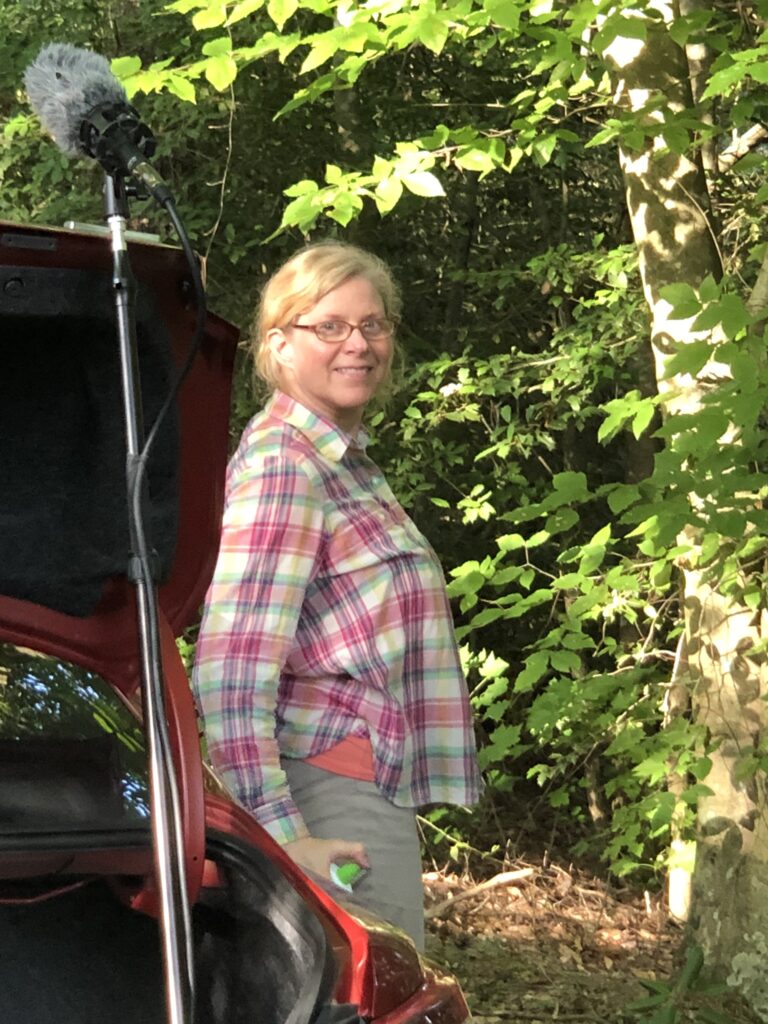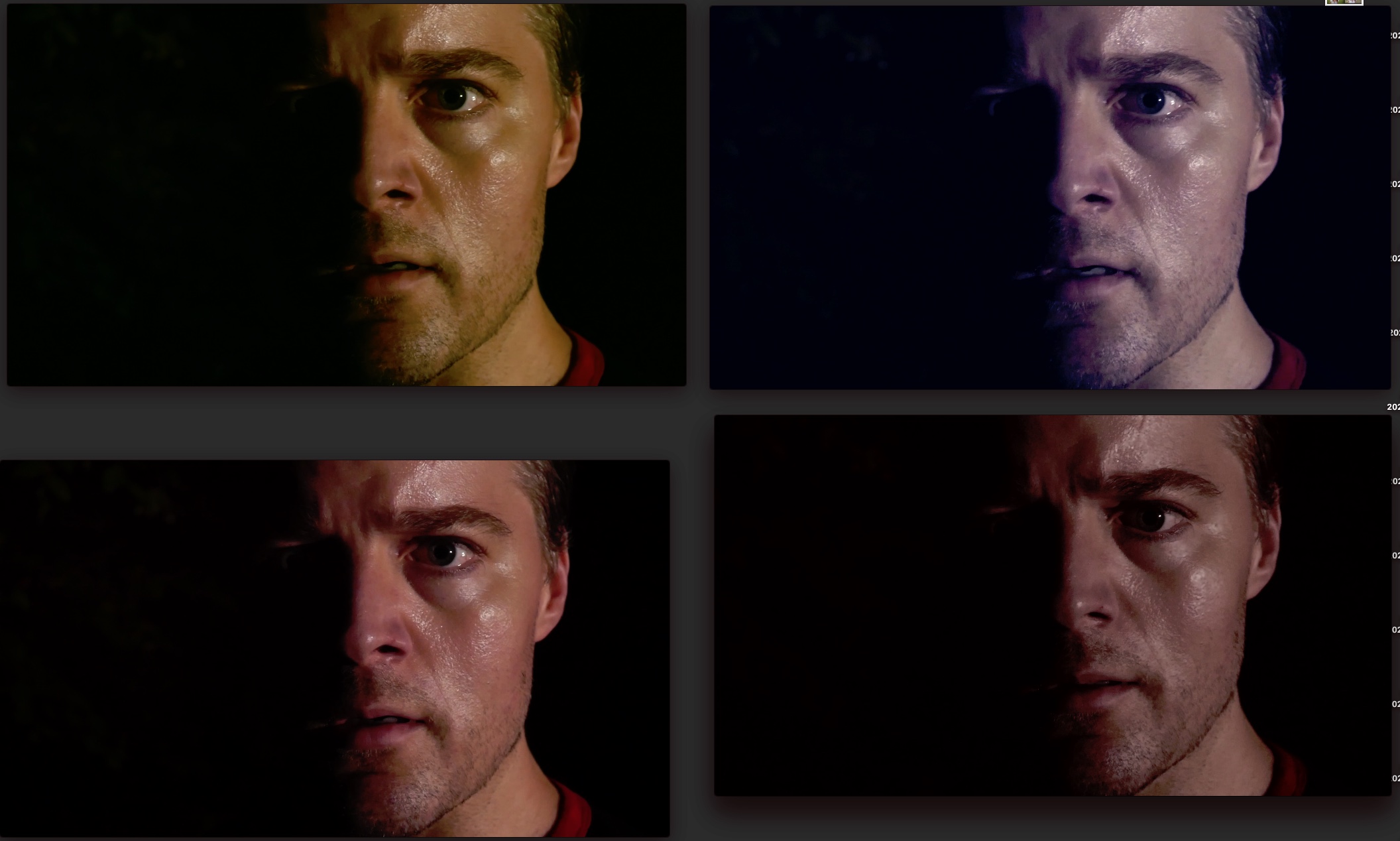Can you GUESS what's in Janet's HAND...?
On this day, she was the Camera Assistant filming at a secluded cabin in the North Carolina foothills last year in June.

"They're coming for all of us."
Can you GUESS what's in Janet's HAND...?
On this day, she was the Camera Assistant filming at a secluded cabin in the North Carolina foothills last year in June.

To quote Janet, my producing partner, after we completed filming last year. For you see, she called me a week before production was to commence and inquired about our "film crew" I was responsible for coordinating. To which I responded, "We're it: you, me, and Judy."
Wrong thing to say to someone with 20 years production experience in Hollywood. Me? 20 years experience writing scripts. I live in a fantasy world, and she let me know it...
Janet managed to recruit a sound recorder at the last moment - so here we were on the set with 3, yes just a 3 "man" crew - me, Janet, and Tony... And sometimes that was just me and Tony.
Fortunately, I practiced guerrilla filmmaking for 6 months prior with camera, sound, lighting and grips, so I was ready for that.
So, we filmed a feature film for 12 days, with 6 actors. We managed to pull it off, but I wouldn't recommend it. We were overwhelmed daily and crossed the finish line beyond exhausted.
There was no time for rehearsals, dailies, and if we had just one more day of rain, we wouldn't have gotten all the shots.
But complete the film, we did.
Weeks later, still suffering from PTSD, Janet and I were discussing post production needs with Judy. We reminisced about those insane 12 days. After we looked at all the footage, Janet then made her comment, to which we're thinking would be a great book title if we ever write about our experiences regarding the making of Blood Pledge.
When Matthew Ewald showed up the day before filming in North Carolina, he showed up quite prepared ~ His script had more notes than Judy and mine’s combined!
I was, to say the least, impressed. Matthew was quite focused on his character’s backstory, presumably to have the subtext to play a humanoid character.
Now, as the creator of his character, later modified by Judy to give “Thoreau” a character arc, we were more interested in his motivations and personality traits, we really didn’t give too much thought to backstory. (Although act 3 touches on his planet’s violent history)
So, here we were, a day before the shoot, and Matthew had all these questions, for which I had no answers. Despite that, the conversation was exhilarating – to hear an actor bring your character to life and discuss Thoreau as he understood him.
Which made me think about aliens in more depth that day. We discussed: would an alien, humanoid in design, have a planet similar to Earth? Would it have oceans, similar weather, a similar evolutionary pattern of life required that would lead to humanoid development? Would the family structure be the same or would it be more like our primate relatives, or be tribal? These were just a few of the questions and ideas we kicked around that day.
I didn’t know, but definitely looking forward to answering these questions in the sequel!
So, we're in post production now and like everything else in this process, it's complex, and like the writing and production phase, many creative decisions are needed!
We had the trailer color corrected and graded (not the one we currently use) and what a truly eye-opening experience.
First choice, "what color theme would you like?"
Turns out for horror, there are three basic themes: red (yeah, for the blood), green (creates an uncomfortable experience for the viewer as well as the sense of death), and blue (more sci-fi feel, works great with night shots).
Here's two examples: (lower left image is "normal")


Based on excellent feedback from Jose Altonaga, horror director, editor and writer.
Here's our logo, created with Adobe After Effects... Kinda fun playing with all these powerful tools.
With the Corona Virus in pandemic mode, time to discuss the nature of viruses in general and how they're governed by Natural Selection.
First, what is a virus? Relatively simple to define, but difficult to explain. Because viruses straddle the boundary between "living" and "non-living," they belong to a special class of organisms (if you want to call them that) that don't fit into biological models of life on Earth.
A virus doesn't carry on life functions - they're essentially a DNA or RNA molecule wrapped in a protein coat. Additionally, viruses are wholly dependent on a host, and I as used to tell my students, they're genetic parasites.
A virus in independent state is known as a virion, and probably fits the definition of non-living. In fact, they can be crystallized and stored like a chemical compound.
It's only when they infect a host do they seem to "come alive." But in fact, they're simply manipulating a host's DNA or RNA to make more copies of itself.
Another discussion I used to have with students, started with the statement: "All viruses cause disease." Without exception. And they infect every known species of life on Earth, and yes even bacteria.
And they've evolved extraordinary strategies to spread themselves. Think of the common cold - a rhino virus usually. One gets a cold, what happens? the virus has infected the mucous membrane, taking over cells, causing them to reproduce millions of copies of the virus. The body wants to rid itself of the virus, so it coughs and sneezes sending those virions out into the environment so they can find the next host.
Since they infect respiratory surfaces, rhino viruses spread rapidly through the population because of mechanisms in place to rid the body of the disease. Rather ironic. Our personal "cure" involves potentially infecting others...
A pandemic? Not difficult to understand when we consider viruses that infect the respiratory system. With a world population over 7 billion and modern travel, respiratory viruses have an enormous surface to spread rapidly.
Yet rhino viruses do not cause pandemics. We recover from colds. Pandemics occur when certain types of viruses, influenza and now Covid-19, spread and induce a high mortality rate and increased hospitalization.
Which brings me to Natural Selection, one of Charles Darwin's great contribution to biology. The power of his theory is evident in that he did not know of viruses, yet they behave in a manner consistent with his theory.
Generally, within any large population, their exists enormous variation. Certainly true for humans, all life, and yes, viruses too.
When viruses infect, they cause their host to make copies. Since this is genetic replication, mistakes are made, also known as a mutation. In essence, a variant of the original virus has been created.
This variant may be benign, or in the case of the H1N1 influenza virus, the new strain is deadly to its host and infects at a higher rate, all because of a genetic mutation. With a higher infection rate, and an infection that's toxic to human organs, a pandemic may occur. This happened with the H1N1 influenza virus in 1968, 1918, and 1890.
Fortunately, we have a dynamic immune system, and just as importantly, and as a population, subject to natural selection as well.
As the virus spreads, Natural Selection will favor those with a rapid immune response, or have no underlying health issues. After the wave of infection, the population in general will have "adapted."
Of course, since viruses also adapt, a new strain will appear possibly creating the next pandemic. It's interesting to note though pandemics occur every 20 to 50 years.
It's an ongoing biological clash between infectious agents and their hosts. Will we survive? Of course we will. Besides an adaptive immune response, Natural Selection has given humans the capacity to intellectually understand and socially adapt, creating an environment to limit the infection rate, as we're doing now.
First round of editing is complete! Here's our first trailer based on the edit.